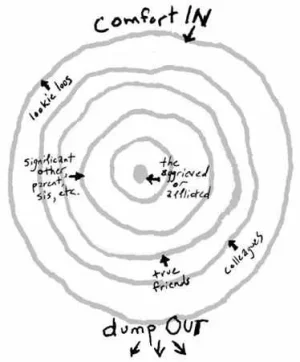- MBTI
- INFJ
- Enneagram
- 5w4
INFJs are famous for feeling other people's emotions. Unfortunately, INFJs don't excel at verbal communication. How do we let people know we understand, that "we feel what they feel" and express empathy, without sounding like we are trying to take focus off them?
The easiest way to show empathy is by saying something like, "I understand," or, "I feel your pain". The issue here is that both of those statements sound self-centered because they begin with "I".
People are often taught to express empathy by relating personal stories to the person who is suffering in order to explain that we understand. This, again, takes the focus off the one who is (suffering) and can sound self-absorbed.
When writing letters, one should not overuse "I/me" because it looks self-centered to write, "I/me/my" over and over. The writer should create phrases that are focused on the person they are addressing. Conversation is more casual, and "I understand," dominates. "You are understood," sounds weird though, and doesn't convey that we specifically understand the person we are addressing. "I am here for you," also starts with "I", but at least that is giving commitment, which is not a passive "I understand."
For INFJs who feel like we already understand the emotions person is going through, the phrase, "It sounds like you are in a hard place now. Tell me more about it.” sounds disingenuous. We already know the person is in a hard place. We feel it.
So, this thread is an empathy workshop to share and create ideas that will help people express empathy in a way that leaves us out of the picture and focuses on the person who is suffering. Any and all ideas are welcome. One of the key ingredients of expressing empathy is putting oneself in the other person's shoes, and trying to understand their perspective, so please keep fighting and name calling out of this thread. <3
The easiest way to show empathy is by saying something like, "I understand," or, "I feel your pain". The issue here is that both of those statements sound self-centered because they begin with "I".
People are often taught to express empathy by relating personal stories to the person who is suffering in order to explain that we understand. This, again, takes the focus off the one who is (suffering) and can sound self-absorbed.
When writing letters, one should not overuse "I/me" because it looks self-centered to write, "I/me/my" over and over. The writer should create phrases that are focused on the person they are addressing. Conversation is more casual, and "I understand," dominates. "You are understood," sounds weird though, and doesn't convey that we specifically understand the person we are addressing. "I am here for you," also starts with "I", but at least that is giving commitment, which is not a passive "I understand."
For INFJs who feel like we already understand the emotions person is going through, the phrase, "It sounds like you are in a hard place now. Tell me more about it.” sounds disingenuous. We already know the person is in a hard place. We feel it.
So, this thread is an empathy workshop to share and create ideas that will help people express empathy in a way that leaves us out of the picture and focuses on the person who is suffering. Any and all ideas are welcome. One of the key ingredients of expressing empathy is putting oneself in the other person's shoes, and trying to understand their perspective, so please keep fighting and name calling out of this thread. <3

